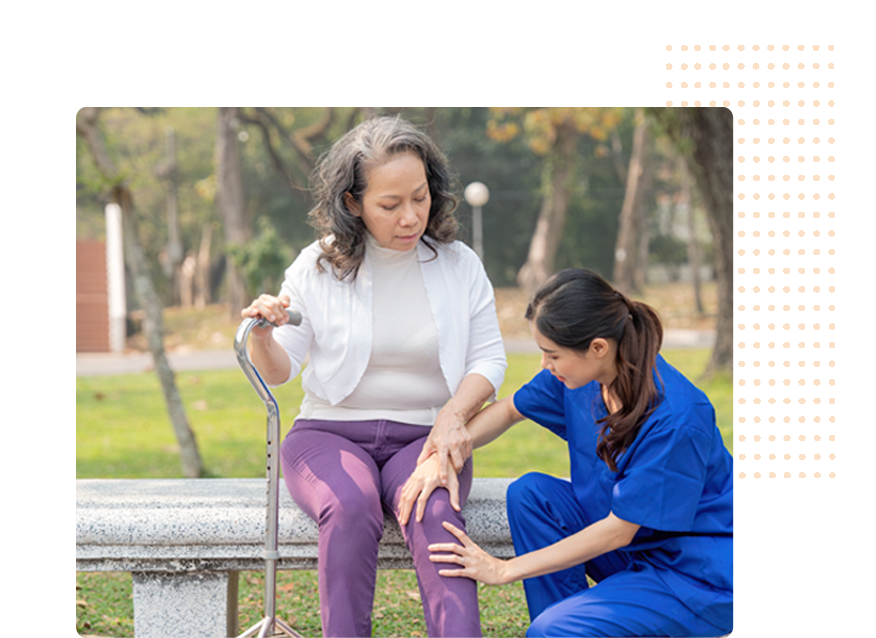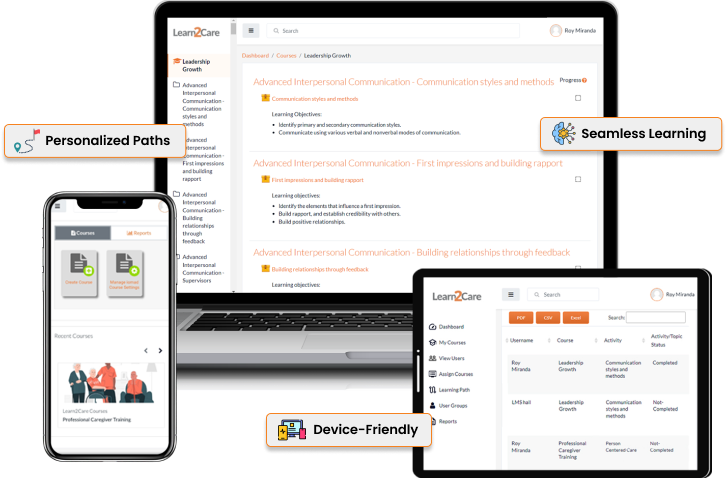
State Recommended Courses

Caregiver Training Certification
Online
Courses
Hours of Online
Content

Leadership
Courses
Initial Training Hours: Training is required based on consumer-specific needs and conditions.
Annual Training Hours: Agency discretion
Initial Training Hours: Training topics specified; duration not specified
Annual Training Hours: Training is required based on caregiver competency and client-specific needs and conditions.
Initial Training Hours: 100
Annual Training Hours: 12
Comments: Training approval is required - coming soon to Learn2care
Disclaimer: We are committed to helping you stay informed and confident in your compliance efforts with the most accurate, up-to-date guidance we can provide. Our guides and resources are designed to support your training and compliance work, though state regulations may vary and change frequently. Please consult your state’s licensing or regulatory body for official guidance, publications, or requirements.

Background Check
Fingerprint-based criminal check, adult abuse registry screening required.
Age Requirement
Caregivers must be 18 years or older to perform caregiving duties.
Health Requirements
Negative TB test, immunizations (flu, MMR), sometimes physical exam.
Regulatory Framework
Maryland Department of Human Services, Maryland Department of Health and Mental Hygiene, Maryland Department of Health
Salary
Average $14.64/hour or $30,448/year (Indeed, January 2025 data).
Don’t let confusion around caregiver training hold you back! Our engaging eBook is packed with essential insights on Maryland’s training requirements, ensuring you meet compliance effortlessly.


Equip caregivers with essential skills tailored to your agency's needs. Upskill administrators, managers, and office staff in leadership, communication, and team management.

Access 230+ online caregivers and leadership training courses, featuring over 185 hours of engaging content to effectively train your caregivers and home care agency staff.

Create personalized learning journeys by tailoring training to specific roles and areas of expertise such as Alzheimer's care, infection control, and restorative care.

Easily track and report on assignments, completion status, quiz scores, and each caregiver's overall progress with our streamlined Progress Monitoring system.

Equip caregivers with training that complies with US CMS HHA Conditions of Participation for home health aide services, ensuring high-quality care.

Upload your own training materials or allow your team to access built-in courses, streamlining essential training in one easily accessible location.


Learn2Care offers seamless, on-the-go learning with courses accessible anytime, even with limited internet. Compatible with PCs, tablets, and phones, it provides personalized and simple learning paths tailored for caregivers.
Get quick insights into caregiver certification, training hours, and how Learn2Care simplifies the process for you.
Training for home care workers in Maryland is regulated by the Maryland Department of Health under COMAR 10.07.05 (Residential Service Agencies) and 10.39.01.08 for HHAs.
No fixed hours are required. Instead, training must be consumer-specific, with ongoing instruction as needed to maintain competency, per the client’s needs.
Yes. Training sources other than the employing agency may be used, but they must be approved in writing by the Office of Health Care Quality.
There are no mandatory hour-based training requirements, but aides must receive topic-specific training tailored to each client's needs, ensuring competency.
HHAs must complete 100 hours of training, including 12 hours of clinical work, and must also be Certified Nursing Assistants (CNAs).
Yes. Medicaid services fall under stricter oversight through Residential Service Agencies, while private-pay agencies have more flexibility but must still meet competency expectations.
There is no mandate, but given the high incidence of Alzheimer’s in the state, agencies are encouraged to include Alzheimer’s and dementia training as part of staff development.
No statewide mandatory topic list exists, but training must ensure staff can meet client-specific care needs. Agencies should assess staff competency regularly.
While role transitions aren’t regulated by a statewide certification, agencies are expected to ensure staff are competent in the specific tasks assigned, especially in client care.
Here’s why training rocks for you and your agency:
Training shows your agency’s all about quality and care, setting you and your clients up for success.